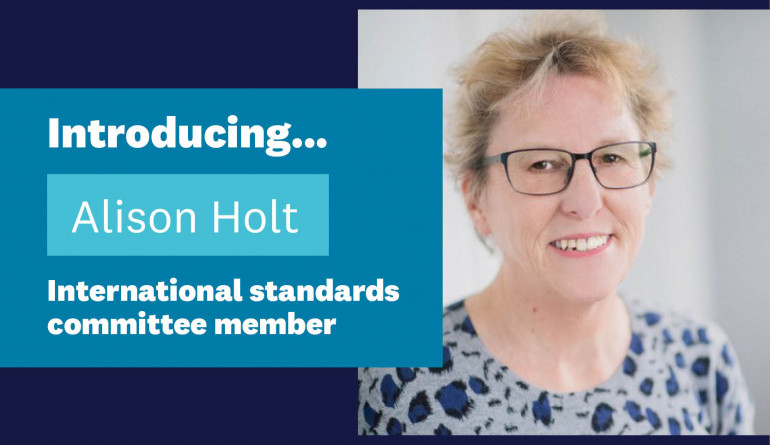Alison Holt – building bridges connecting our digital world
Committee members are at the heart of helping to develop the thousands of worldwide and New Zealand standards that keep us safe, protect information and allow businesses to thrive.

These industry champions contribute to detailed technical specifications, or provide oversight on process development through discussions with other experts both nationally and across the world.
So who would be part of this and why?
A business founder, Oxford academic, international author, and experienced IT professional, Alison Holt is an authority in the IT and data industries. Having lived in Europe, New Zealand, Australia and currently Papua New Guinea, she is a global citizen bringing a broad cultured perspective to international IT and data standards development since 2005.
Alison has chaired committee working groups, representing Standards New Zealand, for several international standards, including the first IT service management standard. ‘Getting to set standards in the area you work in means you see the relatable and real benefit. Standards development means you get to corroborate your experiences with others and even refer to your own standards in your daily work. A business adopting an international standard for internal use gets a head start on accepted best practice and an opportunity to develop a product or service that has a potential international market from inception.’
How do the standards you’ve worked on help people?
‘Standards development needs inquisitive people to ask reflective questions. Regarding data collection, for example, asking what you collect and why? What do you do with the data once you have it? Is the data collected fit for the intended purpose?'
'Data protection is fundamental in our connected world and without realising it standards are helping keep your visual identity, privacy, finances and daily actions safe.’
‘With New Zealand being such a long distance from trading partners there is a need for strong IT systems that are trusted and can integrate seamlessly and reliably with other countries. Standards ensure interoperability.’
‘Some people portray standards as crusty,’ she says half-jokingly, ‘but actually they are not like that when you help develop them and decide what they look like. The people around you influence them and I’ve travelled the world meeting interesting and diverse colleagues and local dignitaries.’
‘New Zealand is small and isolated, so having exposure to other cultures and perspectives within your industry helps you realise how you can do things differently, providing learning you can take back to your own work. We can learn a lot from our international partners, like Germany who have good concise technical standards underpinning much of their regulated industry, which positively contributes towards their Gross Domestic Product (GDP) and economic success. Standards are key to that.’
’You’re contributing towards something that will become best practice for the world, and here New Zealand has as much influence as any other country involved – one country equals one vote. Where there are differences of opinions New Zealand has been called upon to mediate as we are perceived as being neutral, innovative, champions of quality and able to listen.’
Is the role rewarding?
‘There’s huge reward in international networking with people who have a common interest. Meetings can be cooperative with everyone bringing something to the table, and during brainstorming you’ll find small points of difference.'
'Ultimately we’re all working to push the frontiers in our shared fields. With standards central to research and development (R&D) you need to be planning at least five years out.'
'A Future Watch group I have been part of with fellow committee members is looking at the impact of blockchain, artificial intelligence and the emerging Internet of Things technologies on the development of smart cities, self-driving cars, augmented reality solutions etc. The standards we create today need to be adaptable and evolving to allow for innovation and change.’
‘My role has taken me around the world, to Moscow (where we were treated to a special tour of the Kremlin to see visiting dignitaries’ gifts given over the years), China, Belgium, France, Ireland, Germany, the Netherlands, the United States, the United Kingdom, Brazil, Canada, Finland, Italy, Japan and Korea. In China in 2017 we met with a senior representative of the Chinese Stock Exchange, responsible for the efficient and secure processing of 9 petabytes of data flowing through his IT systems each day – one petabyte is over 1,000 terabytes.’
‘Another time I was presenting on data governance standards at a conference at the Bellagio in Las Vegas. Barnes and Noble were running a pop-up book shop during the conference and selling copies of my first book, “Governance of IT”. It was quite an experience signing copies next to an exhibition of Fabergé eggs.’
‘I’ve had committee meetings take place in a chateau just outside Paris, a board room in Suzhou, China and from my own home online through Zoom. Since COVID-19 there aren’t the opportunities for face-to-face meetings, and it takes a little more effort to build the same level of rapport via video-conferencing. It is much easier to video conference with colleagues that you have already met face-to-face.‘
So who would be an ideal committee member?
‘I believe committees need a good balance of younger and older, more experienced people and not just those involved in policy writing, but creatives, innovators, pragmatists. Students will be able to contribute fresh perspectives on emerging technologies like AI, but those with a bit more experience, perhaps around early 40s, will have lived the subject and have more experience of the human side of standards, how it can be adopted, how it impacts real-world application. Standards development needs people who know how the world works.’
If Alison has inspired you to consider participating, you can find more information on Standards New Zealand’s website.
